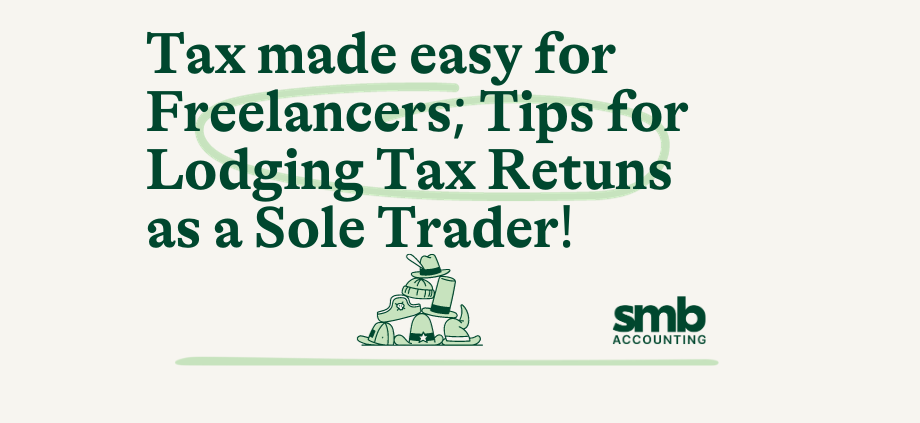Tax Made Easy for Australian Freelancers: Tips for Lodging Tax Returns as a Sole Trader
As the workforce evolves and the gig economy blossoms, many Australian individuals are exploring the world of freelancing or working as sole traders to enjoy flexibility and unleash their entrepreneurial spirit. While this working arrangement can offer numerous benefits, navigating the tax landscape may be daunting for those less familiar with the tax obligations and nuances associated with being a freelancer.
At SMB Accounting, we are committed to providing educational, informative, helpful, and unique content to support Australian freelancers and sole traders as they embark on their financial journeys while engaging in freelance work.
In this article, we will discuss essential tax tips for freelancers and sole traders, focusing on understanding the different tax obligations, identifying deductible work expenses, adopting best practices for record-keeping, and leveraging professional accounting assistance for maximum impact. By being aware of these crucial tax tips, Australian freelancers and sole traders can not only fulfil their tax obligations but also optimise their hard-earned income and maintain an accurate record of their financial position.
Understanding Tax Obligations as a Freelancer or Sole Trader
As a freelancer or sole trader, it’s vital to understand your tax obligations to ensure that you comply with Australian tax regulations. Key factors to consider include:
- Registering for an Australian Business Number (ABN): Applying for an ABN is essential to avoid having payers withholding 49% of your income for tax purposes.
- Determining your tax rate: As a sole trader, you pay tax at the individual income tax rates, which are calculated on your total taxable income for the financial year.
- Quarterly tax payments: If you earn more than a certain threshold, you may need to make pay-as-you-go (PAYG) instalments to cover your projected annual tax liability.
Familiarising yourself with your tax obligations as a freelancer or sole trader enables you to plan ahead, optimise your income, and maintain compliance with Australian tax regulations.
Identifying and Claiming Deductible Work Expenses
Freelancers and sole traders can reduce their taxable income by claiming work-related expenses as tax deductions. Consider claiming deductions for:
- Home office expenses: If you use a dedicated workspace for running your business from home, you can claim a portion of home office expenses, such as electricity, rent, and repairs.
- Equipment and supplies: Claim deductions for work-related equipment, such as computers, printers, and software.
- Travel expenses: If your work requires you to travel, you may be eligible to claim deductions for costs like airfare, accommodation, and vehicle use.
- Professional development: Expenses related to improving your professional skills, attending relevant workshops, or maintaining professional memberships can be deductible.
Keep accurate records of these expenses to substantiate your claims during the tax return process.
Record-Keeping Best Practices for Freelancers and Sole Traders
Maintaining well-organised and accurate records is essential for managing your tax obligations and maximising deductions. Consider these record-keeping best practices:
- Separate business and personal finances: Establish a separate bank account for your business to accurately track and record income and expenses.
- Use accounting software: Implement an accounting software solution like Xero to manage your financial transactions and generate reports on income, expenses, and taxes.
- Keep detailed records: Record all business income, expenses, and any cash transactions to provide a clear picture of your financial position.
- Retain your records: Retain your records for five years, including receipts, invoices, bank statements, and records of expenses related to deductible items.
Implementing these record-keeping practices ensures that you have accurate financial data to base your tax return claims on and safeguards against potential tax discrepancies.
Leveraging Professional Assistance for Tax Return Success
While managing your tax return as a freelancer or sole trader may seem manageable, enlisting the help of a professional accountant can provide invaluable benefits, such as:
- Expert advice: A professional accountant can offer tailored tax advice, helping you identify additional deductions and ensure that you fulfil all your obligations.
- Time savings: Preparing your tax return can be time-consuming, but with professional assistance, you can allocate more time to growing your business.
- Peace of mind: Working with a professional provides the assurance that your tax return is accurate and compliant with Australian tax laws.
Investing in professional assistance can help you optimise your tax return, minimise potential mistakes, and maximise income and savings.
Embrace Tax Best Practices to Ensure Freelance Success
Navigating the tax landscape as an Australian freelancer or sole trader can seem daunting, but by understanding your tax obligations, claiming deductible work expenses, maintaining accurate records, and seeking professional assistance, you can manage your tax return with confidence and achieve success.
Let SMB Accounting guide you through the complexities of the Australian tax system, offering valuable insights, practical advice, and expert support to help you achieve your financial and entrepreneurial dreams. Contact our tax consultant today for more information.

